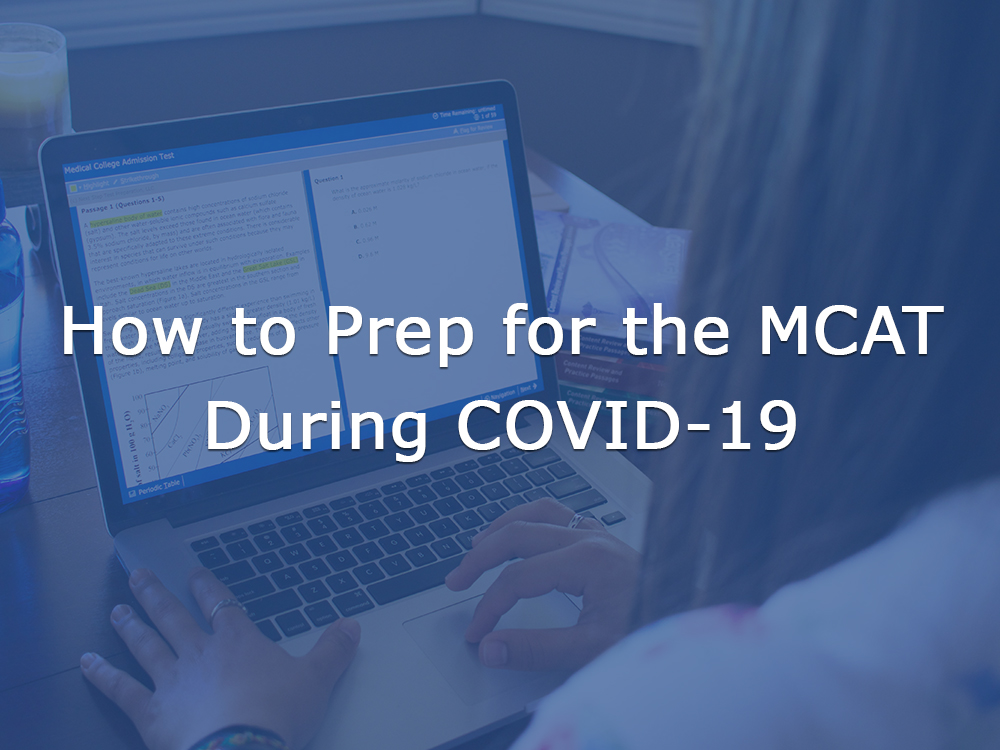Written By Caeley Gullett, MCAT Content Developer and SR. MCAT Tutor
As far as decades go, 2020 is kicking off a new one with a bang—and it’s only March. It’s been a crazy couple of weeks with the COVID-19 outbreak going from a staggering topic of overseas news to a full-on pandemic shutting down multiple countries and arriving, rather abruptly, at our doorsteps. The AAMC decided to take unprecedented steps to keep students safe and comply with the practice of social distancing. The situation changes almost daily, but here’s what we know.
Canceled MCATs
Pearson canceled the March 27 and April 4 MCAT administrations due to concerns surrounding COVID-19. All students were given a refund and offered the chance to sign up for a new test date. Students taking other April or May MCAT test dates were also given the opportunity to reschedule with no rescheduling fee. Though it’s good news that everyone is being refunded and that fees are being waived even outside of the “Gold Zone”, it has left many examinees wondering: How do I study for the MCAT for a month after I was prepared to take it? Or, even more pressing: how do I study for the MCAT when I no longer know when my test date will actually be? Both of these questions are now at the forefront of tons of students’ minds, and I’d like to take some time to address them.
Prepping for the MCAT During the Time of COVID-19
Before you start, take a deep breath. There’s a lot of uncertainty right now, not just surrounding all things pre-med, but throughout our society in general. So when you find yourself getting anxious, remind yourself that a lot of the world is in the same boat, and that AAMC and admissions committees will have to acknowledge that. While we’re not sure (at the time of publication) how the admissions cycle will be affected, Dr. Ryan Gray of Medical School HQ has some predictions.
What happens if my MCAT is canceled and/or I need to reschedule?
If you either want to or have to reschedule your MCAT, go ahead and try to do that as soon as possible so that your test date and location of choice don’t fill up. If there are no spots remaining for your ideal date, then it’s time to make a tentative plan.
First, try to decide if you will be taking the MCAT more or less than a month later than you originally planned. If you can at least decide on June or July versus August or September, that will help significantly with your planning. If you’re leaning towards a later test date or if you’re truly uncertain, the best thing you can do right now is work on building a skillset. Use AAMC’s resources, and work hard to understand the “why” behind every problem – why is the correct answer choice what it is? Why did you miss a certain question? Why did you have to reference Figure 1? Why could you infer something from a particular CARS passage? If you work on building a deeper understanding of these sorts of things, you can construct a strategic proficiency that will endure until your test day, as well as make your resources last longer. This will be much more beneficial than trying to mass-memorize content such as amino acid structures or functional groups, which you will almost definitely forget between now and your exam.
However, if you have a more established timeline, the first thing you should prioritize is taking more full-length exams. AAMC has 5 and Next Step (Blueprint MCAT) has 10 of the most representative practice MCAT exams, and it is unlikely that most students have taken all 15 by their intended test day. Spread out your remaining exams between now and your new exam date, taking one every week or every other week, and then thoroughly reviewing each one. Most students don’t maximize the benefit they can get from full-lengths, but now is your chance to do so. During your MCAT exam review, analyze all of the questions thoroughly, and use them to figure out what you don’t know. This may be content such as acid-base equilibrium or skills like interpreting complex figures. Whatever you find, make a list of these difficulties following each practice exam, and work on improving those areas.
When it comes to content, you can also check the AAMC Content Outline as well as the “Must-Knows” section at the end of every chapter in the Blueprint MCAT (Next Step) books to figure out what you need to review. I recommend highlighting concepts that you aren’t 100% confident in, and then find multiple mediums with which to review them. If you’re a Blueprint MCAT (Next Step) course student, use our Content Review Videos as a refresher.
If you have somehow managed to work through every single resource that is available to you, focus on redoing and reviewing the AAMC resources. The goal here is to understand the logic of every single question, how to approach it, why the right answer is right and why the wrong answer is wrong, and so on. Since these sources were produced by the people who write the actual exam, this is your opportunity to really get inside their heads and master the best ways of approaching and thinking about MCAT questions.
Working-From-Home? Here’s How To Prep For The MCAT At Home
It’s safe to guess that you will be doing all of this from home instead of a coffee shop or a library, so I wanted to end with a few tips on working (and staying productive) while at home:
1. Make a schedule and stick to it.
Our class and/or work schedule usually provides structure to our days, but now it’s up to you to do this from home. Try to stick as closely as possible to the routine you’ve had so far. If you usually study for your MCAT on Monday, Wednesday and Friday, and then take practice exams on Saturdays, keep doing that. With so many other adjustments being made right now, this is probably not the time to completely overhaul your approach to studying.
2. Study in smaller increments.
If you now have the luxury of doing so, try to spread your study time throughout the day. Research shows we focus best for small periods of time that are spread out, as opposed to during one large time block. I recommend a morning and an afternoon/evening session if possible.
3. Create your MCAT Study Space.
Make sure you designate one or two MCAT study spaces in your home. All you should do in these locations is study MCAT or maybe do a bit of coursework for school. If you live in a tiny apartment, it’s okay if this is just a certain desk or table, and not an actual room. You just want to ensure that these spaces are quiet and free from distractions, as well as remain separate from your relaxation spaces, such as your bed. This will help your brain enter into “study mode” when you are in this space. This is especially essential when taking practice exams – you want to replicate the testing environment as accurately as possible, so be sure to tell anyone you live with to try to stay quiet, and avoid getting distracted by other obligations, such as text messages or household chores.
4. Don’t forget self-care.
Prioritize time in your schedule for meals and exercises. It’s okay if you’re not into weightlifting or distance running. Simply set aside 30 minutes to stretch or throw an impromptu dance party in your living room; doing so can significantly improve your mental health and studying performance. Even better, schedule your study time right after you take a break for exercise or food – your brain will be refreshed and ready to go.
Even if you didn’t expect or want to be in this situation, try to take advantage of it. You now have more time to study for your MCAT, and you can use this time to fully master topics you might have been a bit “iffy” on before. Use this chance to push your score to the next level, and maximize your resources. Form a virtual study group to maintain a social component to studying if you’d like. No matter what, try to focus on the positives on this situation and not the uncertainty. Take it as an unexpected but valuable opportunity, and use it to ace your MCAT exam!
Blueprint MCAT (Next Step) is committed to helping students stay informed by delivering the latest and most accurate information about the changes to the MCAT schedule and upcoming med school application cycles caused by CPVID-19. Keep up-to-date by following us on social media and our MCAT blog for any breaking news and useful tips for prepping for the MCAT and applying to med school during these unpredictable times.
Blueprint MCAT (Next Step) is a leader in representative MCAT prep. Whether you need the flexibility of a Self-Paced Course, the instruction of a live 515+ Course, or the 1:1 attention of a private MCAT tutor, Blueprint MCAT has the MCAT prep option that works for your learning style!




